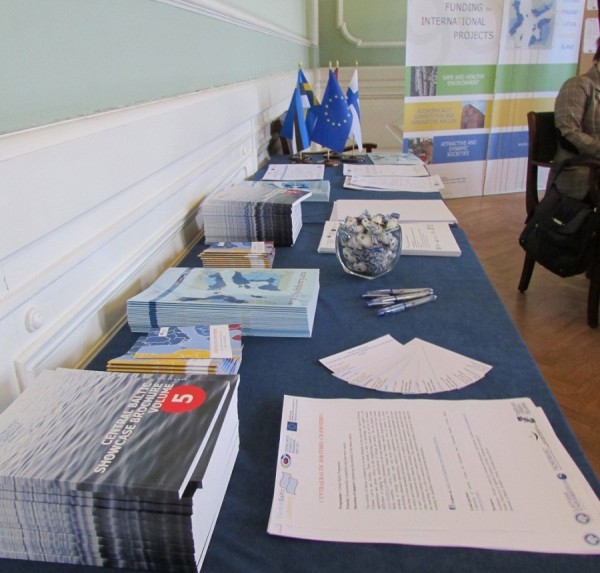Conference at the University of Latvia discussed important issues for improving the cross-border labour mobility in the Central Baltic region
23 June 2013
On March 19, 2013 the conference of the “Centralbaltic Job Ferry” project on the cross border labour mobility issues in the Central Baltic region took place at the University of Latvia (UL). Around 50 conference participants including representatives of the European Commission Representation in Latvia, Central Baltic INTERREG IV A Programme 2007-2013 Joint Technical Secretariat, Ministry of Economy of the Republic of Latvia, regional labour market institutions (EURES, career consultants, etc.), universities, professional education establishments, employers organizations, enterprises, labour unions, state and private employment services, as well as cross-border regions of the European Union (Polish – German cross-border region and German – Czech cross-border region), representatives from organizations and projects dealing with the labour market, mobility and regional development issues gathered in Riga.
The conference was opened by the Vice-rector for Research of UL – Professor Andris Kangro and the Director of the UL Centre for European and Transition Studies – Professor Tatjana Muravska – representing the Lead Partner of the “Central Baltic Job Ferry” project. A high level speaker from the Representation of the European Commission in Latvia – Deputy Head Mr. Andris Kužnieks and the Head of the Joint Technical Secretariat, Central Baltic INTERREG IV A Programme 2007-2013 Dr. Philipp Schwartz addressed conference delegates stressing the importance of cross-border cooperation for regional development and well-being of people.
Senior researcher of the project partner organization Nordregio – Dr. Petri Kahila presented research results on the labour market mobility in the Central Baltic region. This research is one of the project outcomes conducted by its partners and the final research report will be published this summer. Research results indicate that the cross-border labour mobility remains comparatively low in this region.
Project partners have developed policy recommendations which were presented and discussed during the conference. The policy recommendations are targeted to European Union, national (Estonia, Latvia, Finland, Sweden) and regional levels (regions of the Central Baltic programme) and focus on increasing the flow of information and communication, improving knowledge and cooperation, increasing the exchange of information and knowledge, supporting activities on the regional level, ensuring targeted information for employment seekers, facilitating the application of practical methods and solutions, as well as other measures promoting labour mobility and integration. Please, see more information on policy recommendations and the Policy brief on the project platform: http://www.cbjobferry.eu/publications
Conference participants were introduced with the Internet platform www.cbjobferry.eu developed during the project implementation which offers mutually comparable information on the most demanded professions (more than 200 professions) in the Central Baltic region in five languages (English, Finish, Estonian, Latvian, Swedish). The platform contains information about professional qualifications, labour conditions, professional requirements, recognition of education documents, potential employers and other details having relevance to professions included in the platform. During the conference, Mr. Stefan Pommer from the MKW (Germany), an organization that was responsible for implementing IT solutions for the platform, introduced participants with opportunities for individual platform users, as well as organizations and companies which would like to register on the platform and explore its features.
Conference speaker from the Economic Development, Transportation and Environment Centre of the Southwest Finland Dr. Jouni Marttinen informed about Finnish experience for forecasting labour supply and demand by applying specially designed instrument for this purpose which is called the “Occupational Barometer”. This instrument helps to follow the demand of particular professions across regions of Finland, as well as to investigate where the labour supply and demand are in balance. Forecasts by the “Occupational Barometer” (http://www.luotain.fi ) are performed every half year and their results are publicly available.
One of parallel sessions taking place in the framework of the conference workshop was devoted to discussing best practices and exchange of experience with other similar projects.
The Project Manager of the Lead Partner’s organizations – the University of Latvia Ms. Zane Zeibote presented best practices acquired during the “Centralbaltic Job Ferry” project lifetime. For instance, one of the best practices of the “Centralbaltic Job Ferry” project has been the study trip to the German – Czech border region where similar project called the European Job Guide has been successfully implemented in close cooperation with EURES. This was very important to understand in the very beginning of the project implementation how the project results are applied in practice and to learn from experience of others.
Ms.Dorothea Möckel, the Project Manager of the “EUROJOB-Viadrina” project which is implemented on the German – Polish border region presented the experience of their platform. Mr. Eduards Filippovs from Latvia informed the participants about the “Baltic Sea Labour Network” project results and the creation of the “Baltic Sea Laour Forum” which all interested parties dealing with labour market issues are invited to join. Also, Mr. Emīls Rode representing another project of the Central Baltic programme – “EXPAT”, informed about the achievements and challenges during the project implementation.
In the second parallel session, the participants discussed the differences and commonalities of national labour markets of the Central Baltic region, as well as policy recommendations and measures to be implemented on national and supra-national levels for strengthening the whole labour market of this region.
Conference participants also had an opportunity to participate in the training session introducing “Centralbaltic Job Ferry” platform possibilities and benefits for employers and employees.
The implementation of the “Centralbaltic Job Ferry” project begun on May, 2011 and it will be completed by the end of August, 2013. Visit the website to find additional information and register to access all benefits of the platform – http://www.cbjobferry.eu




